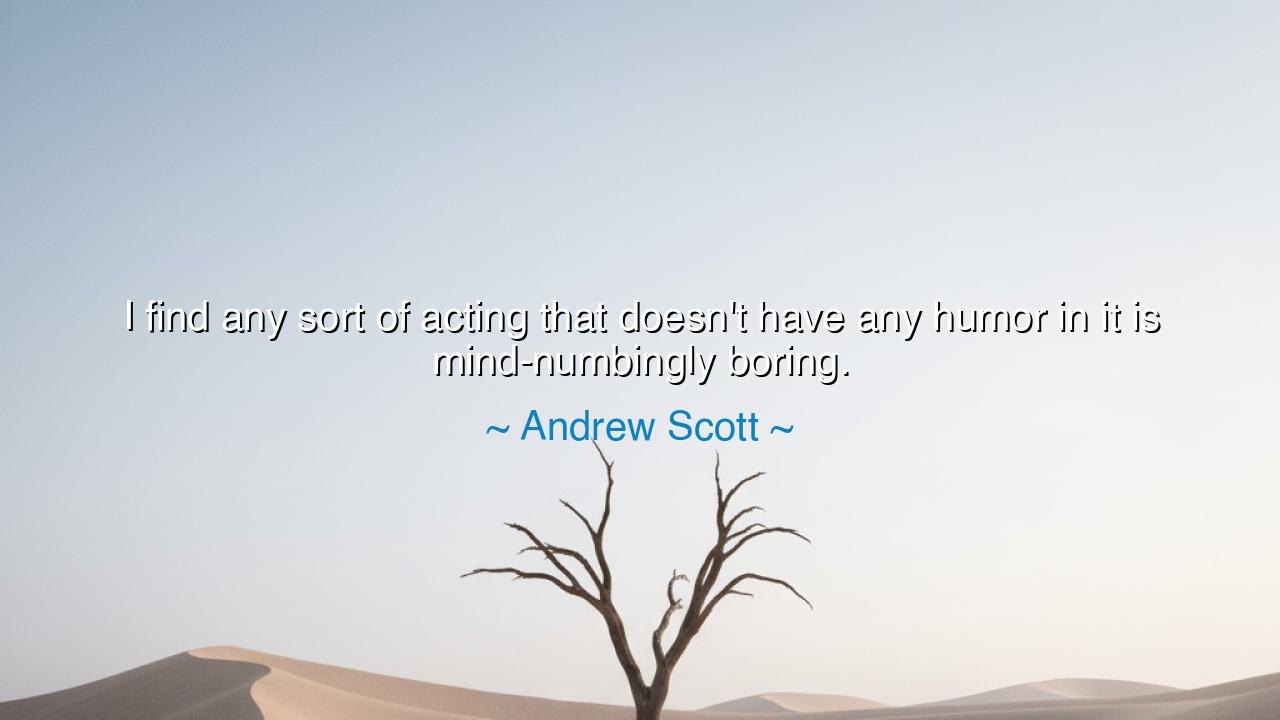
I find any sort of acting that doesn't have any humor in it is






In the great theater of life, where every man and woman plays their part upon the stage, there exists one powerful truth that transcends time and place: without humor, life becomes a hollow performance, devoid of vitality. The great actor Andrew Scott, in his declaration, "I find any sort of acting that doesn't have any humor in it is mind-numbingly boring," touches upon a universal principle—a lesson that the ancients understood well: humor is not merely an addition to life, but a force that animates and energizes the human spirit. Without it, the narrative of our existence becomes tedious and lacking in the richness that makes us truly alive.
In the ancient world, the Greek philosophers and playwrights understood the vitality that humor brought to the human experience. Aristotle, in his Poetics, described comedy as a reflection of human imperfection and absurdity, yet he did so with an eye toward the truth it revealed. For Aristotle, humor was a way to hold up a mirror to society, not to mock it, but to reflect its shortcomings and inconsistencies. Likewise, Scott reminds us that humor is not something extraneous to the art of acting—it is an essential component that breathes life into the craft. Acting without humor, no matter how serious the role, lacks the resonance that allows the audience to connect on a deep and human level.
Consider the work of the great tragedians such as Sophocles, whose plays often blended moments of deep tragedy with humor—the chorus singing in ironic commentary, the fool who makes a witty remark at the height of despair. In Antigone, the suffering of the characters is profound, yet the humor woven through the dialogue prevents the work from becoming unbearably monotonous. Scott’s reflection on humor speaks to this wisdom—even in the most serious and tragic circumstances, the presence of humor is what keeps the audience engaged and emotionally invested, offering moments of release amidst the tension.
The Romans, too, understood this balance between drama and humor. Plautus, a Roman playwright, infused his comedies with moments of sharp wit that not only entertained, but also challenged societal norms. His plays are filled with cunning slaves, absurd situations, and ironic reversals—all of which serve to illuminate the deeper truths of the human condition. Just as Plautus used humor to engage his audience and make his messages accessible, so too does Scott suggest that without humor, acting loses its ability to speak directly to the hearts and minds of those who watch. Humor, in this sense, is not a diversion but a vehicle for engagement and reflection.
The lesson we can draw from Scott’s words is one of balance and engagement. In our own lives, just as in the art of acting, we must recognize the power of humor to connect us to the world around us. To live without humor is to move through the world as if on a stage devoid of life. When we take ourselves too seriously, when we shut out the lighter, more playful parts of our existence, we risk becoming dull and unrelatable, no matter how important or serious our work may seem. Humor has the power to infuse meaning into our actions, to reveal the humanity in our struggles, and to keep us connected to the hearts of others.
The ancients also taught us that humor can be a powerful tool for growth. Plato, though known for his philosophical seriousness, also saw the value in humor for its ability to reveal the deeper aspects of life. In his dialogues, he used humor not to lighten the mood, but to guide the reader toward insight—to see beyond the immediate surface and uncover the truths hidden beneath. In this way, Scott’s statement becomes a deeper meditation on the role of humor not just in art, but in life itself. It is the humor that engages, that releases tension, and that invites reflection, which makes our lives more meaningful, more authentic, and more human.
Let us then take this wisdom into our own lives. Whether in our work, our relationships, or our creative endeavors, let us learn to embrace the lightness that humor brings. Let us not see it as something frivolous, but as an essential ingredient that makes all things more vibrant, more alive. Just as Scott recognizes the value of humor in acting, so too must we understand that life—in all its seriousness and its absurdity—is best lived when we allow humor to weave through our moments, keeping our hearts open and our minds engaged. For it is humor that connects us, it is humor that keeps us from becoming weary, and it is humor that reminds us of the beauty in the imperfection of our shared human journey.






AAdministratorAdministrator
Welcome, honored guests. Please leave a comment, we will respond soon